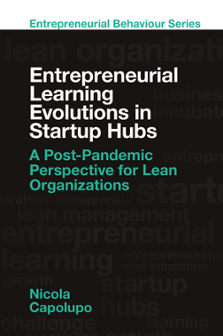
Index
ISBN: 978-1-83753-071-7, eISBN: 978-1-83753-070-0
Publication date: 27 April 2023
Citation
Capolupo, N. (2023), "Index", Entrepreneurial Learning Evolutions in Startup Hubs: A Post-Pandemic Perspective for Lean Organizations (Entrepreneurial Behaviour Series), Emerald Publishing Limited, Leeds, pp. 104-108. https://doi.org/10.1108/978-1-83753-070-020231007
Publisher
:Emerald Publishing Limited
Copyright © 2023 Nicola Capolupo
INDEX
- Prelims
- Chapter 1: The Italian Startup Ecosystem
- Chapter 2: Entrepreneurial Learning and Training in Startup Organizations
- Chapter 3: Incubators' Training and Learning. An Empirical Roadmap
- Chapter 4: Through a New Framework for Entrepreneurial Learning in Startup
- Chapter 5: Looking Forward: Hubs and Entrepreneurs' Skills for the Future
- Bibliography
- Index